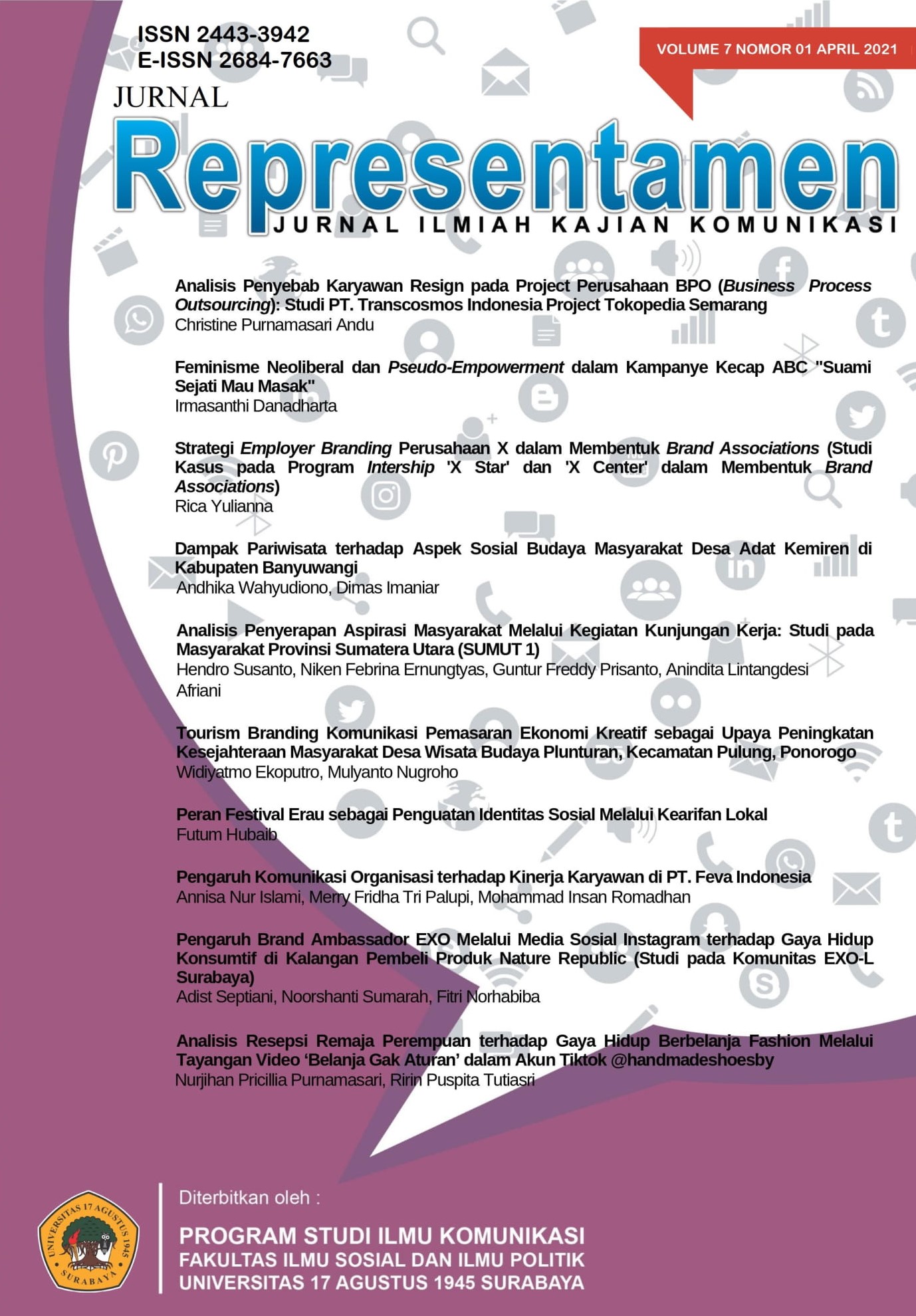Pengaruh Komunikasi Organisasi terhadap Kinerja Karyawan di PT. Feva Indonesia
DOI:
https://doi.org/10.30996/representamen.v7i01.5127Abstract
This study examines the influence of organizational communication on employee performance at PT. Feva Indonesia. Organizational communication has an important meaning in delivering messages within the scope of the organization. One of the organizational behaviors in which there is the delivery of person and information connecting aspects. Good communication fluency depends on a person's ability to communicate and communicate it. The problems that occur are because the communication process is not going well so that information from superiors to employees can cause a misunderstanding because the information conveyed is not understood. With good organizational communication, it is hoped that employee performance will also increase, because it is not an easy thing to improve employee performance. This type of quantitative research uses the total population of employees of PT. Feva Indonesia. Researchers have a role as key informants of 70 employees. The total population is less than 100 people, taken 70 respondents or total sampling. The research conclusion is that organizational communication variables have a significant effect on company performance.
Keywords: organizational communication, employee performance
Downloads
References
Abidin, Z. (2011). Pengaruh pelatihan resiliensi terhadap perilaku asertif pada remaja. Jurnal Pamator, Volume 4(No 2), 129–136.
Anesty, E. (2015). Konseling Rational Emotive Behavioral dengan Teknik Pencitraan untuk Meningkatkan Resiliensi Mahasiswa Berstatus Sosial Ekonomi Lemah. PSIKOPEDAGOGIA Jurnal Bimbingan Dan Konseling, 5(1), 66. https://doi.org/10.12928/psikopedagogia.v5i1.4495
Andreas, Steve, Charles F. (2008). NLP: The new technology of achievement. Yogyakarta: BACA.
Aunillah, F., & Adiyanti, M. G. (2015). Program Pengembangan Keterampilan Resiliensi untuk Meningkatkan Self-esteem pada Remaja. Journal Of Professional Psychology, 1(1), 48–63.
Khalifah, S. (2019). Dinamika Self-Harm pada Remaja.
Maesaroh, S., Sunarti, E., & Muflikhati, I. (2019). Ancaman, Faktor Protektif, dan Resiliensi Remaja di Kota Bogor. Jurnal Ilmu Keluarga Dan Konsumen, 12(1), 63–74. https://doi.org/10.24156/jikk.2019.12.1.63
Mastika, R. (2016). NEURO LINGUISTIC PROGRAMMING (NLP) UNTUK MENGATASI DEPRESI PADA PENYANDANG TUNA DAKSA YANG MENGALAMI KECELAKAAN LALU LINTAS DI BBRSBD SURAKARTA [Universitas Muhammadiyah Surakarta]. In Gower Handbook of People in Project Management. https://doi.org/10.4018/978-1-61520-753-4.ch012
Nabiela, Elda Savitri, D. (2016). Kesepian Dan Keinginan Melukai Diri Sendiri Remaja. Psympathic : Jurnal Ilmiah Psikologi, 2(2), 185–198. https://doi.org/10.15575/psy.v2i2.459
Ong, A. D., Bergeman, C. S., Bisconti, T. L., & Wallace, K. A. (2006). Psychological resilience, positive emotions, and successful adaptation to stress in later life. Journal of Personality and Social Psychology, 91(4), 730–749. https://doi.org/10.1037/0022-3514.91.4.730
Pasudewi, C. (2018). Resiliensi Pada Remaja Binaan Bapas Ditinjau Dari Coping Stress. Intuisi : Jurnal Psikologi Ilmiah, 6(2), 92–97.
Potter, D. (2010). Psychosocial well-being and the relationship between divorce and children’s academic achievement. Journal of Marriage and Family, 72(4), 933–946. https://doi.org/10.1111/j.1741-3737.2010.00740.x
Rahmawati, E. (2016). PENERAPAN TERAPI NLP (NEURO LINGUISTIC PROGRAMMING) UNTUK MENURUNKAN KECEMASAN BERBICARA DI DEPAN UMUM PADA SISWA KELAS XI SMA NEGERI 2 PARE. Jurnal BK., 4(3), 645–659. https://doi.org/10.4018/978-1-61520-753-4.ch012
Ratnawati, A. (2015). Uji validitas dan Reliabilitas Instrumen Self-Harm Behavior Questionnaire (SHBQ) Versi Bahasa Indonesia.
Reivich, Seitte, & Dimascio, J. (2018). Building resilience. Aviation Week and Space Technology, 180(15), 52–54. https://doi.org/10.7748/ns.26.32.16.s21
Riskesdas. (2013). RISET KESEHATAN DASAR.
Ruswahyuningsih, M. C., & Afiatin, T. (2015). Resiliensi pada Remaja Jawa. Resiliensi Pada Remaja Jawa, 1(2), 96–105. https://doi.org/10.22146/gamajop.7347
Septiawati, K. (2018). RESILIENSI PADA NARAPIDANA PEREMPUAN PADA KASUS TIPIKOR DI LEMBAGA PEMASYARAKATAN PEREMPUAN KELAS IIA PALEMBANG (Vol. 11, Issue 11). https://doi.org/10.1063/1.4914609
Sholih, Rochani, Khairun, D. Y., & Hakim, I. Al. (2014). MENINGKATKAN RESILIENSI REMAJA MELALUI BIBLIOCOUNSELING. UNTIRTA.
Smith, B. W., Dalen, J., Wiggins, K., Tooley, E., Christopher, P., & Bernard, J. (2008). The brief resilience scale: Assessing the ability to bounce back. International Journal of Behavioral Medicine, 15(3), 194–200. https://doi.org/10.1080/10705500802222972
Stefani Dipayanti, & Lisya Chairani. (2012). Locus Of Control dan Resiliensi Pada Remaja Yang Orang Tuanya Bercerai. Jurnal Psikologi UIN Sultan Syarif Kasim Riau, 8(Juni), 15–20.
Valentina, M. (2016). Resiliensi siswa SMA Negeri 1 Wuryantoro. 39(5), 97. http://repository.usd.ac.id/id/eprint/6196
Whitlock, J., Exner-Cortens, D., & Purington, A. (2014). Assessment of nonsuicidal self-injury: Development and initial validation of the Non-Suicidal Self-Injury-Assessment Tool (NSSI-AT). Psychological Assessment, 26(3), 935–946. https://doi.org/10.1037/a0036611
Wiwoho, RH. (2010). Understanding NLP. Jakarta: INDONLP.
Downloads
Published
Issue
Section
License
Authors whose manuscript is published will approve the following provisions:
The right to publication of all journal material published on the jurnal representamen website is held by the editorial board with the author's knowledge (moral rights remain the property of the author).
The formal legal provisions for access to digital articles of this electronic journal are subject to the terms of the Creative Commons Attribution-ShareAlike (CC BY-SA) license, which means Jurnal Representamen reserves the right to store, modify the format, administer in database, maintain and publish articles without requesting permission from the Author as long as it keeps the Author's name as the owner of Copyright.
Printed and electronic published manuscripts are open access for educational, research and library purposes. In addition to these objectives, the editorial board shall not be liable for violations of copyright law.











